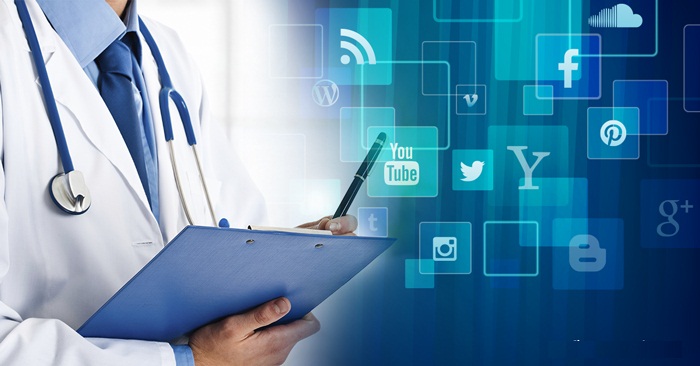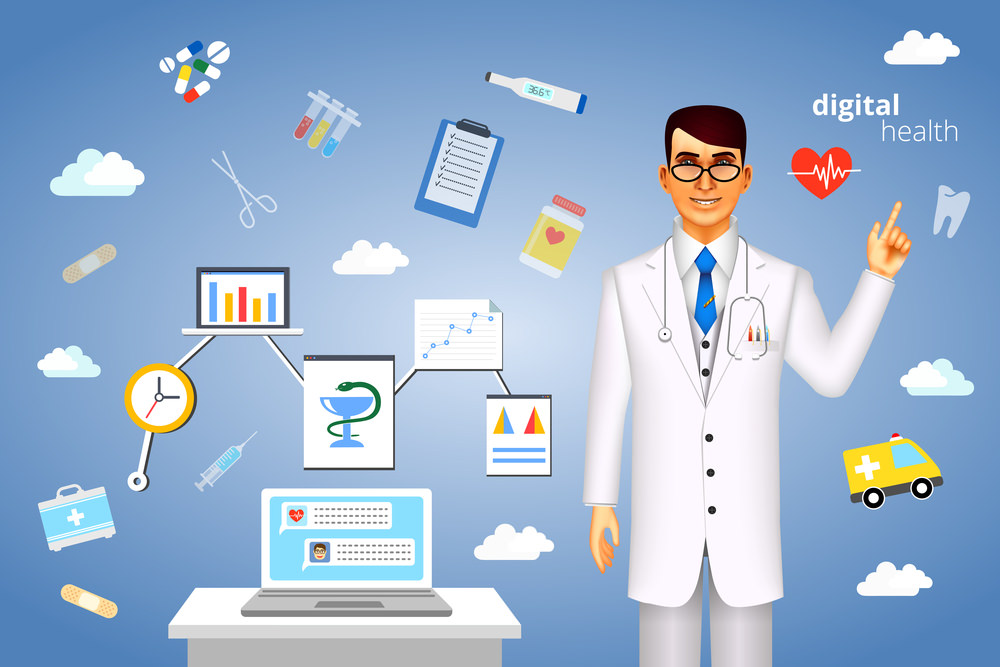Social Media and it's Importance on Health Care Industry
Blog from: E-Health Care Lists | 09 DEC 2019


There certainly isn’t an area where social media hasn’t had an influence. People use social media to share ideas, seek knowledge, and share narratives about their lives.
Healthcare hasn’t been banned from this in any way. In fact, 60% of doctors see social media as a road for achieving more reliable healthcare to sufferers.
Of course, that doesn’t mean that there aren’t anxieties. For example, the ways that personalities prefer to use Facebook can point to negative consequences.
Nonetheless, the impingement social media is possessing and stands to have on global healthcare is a topic worth investigating as there are meaningful privileges and shortcomings it can project on both patients and medical professionals.
Social networks have grown into an essential health resource, and not just for Millenials. Nearly 90 per cent of older adults have used social media to explore and share health news.
It can be difficult to understand how to operate healthcare social media rules. Providers, agencies, and brands require to produce enlightening, captivating social content. At the same time, you require to understand industry laws and statutes.
In this post, we look at the multiple advantages of adopting social media in healthcare. We also present some suggestions on how to preserve your social channels compliant and protected.
What is Social Media?
The meaning of “social media” is deep and continually developing.
The term commonly applies to Internet-based tools that enable individuals and societies to mobilise and interact; to share knowledge, opinions, personal notes, images, and different content; and, in some instances, to cooperate with different users in real-time.
Social media are also related to as “Web 2.0” or “social networking.”
Social media sites present a mixture of peculiarities that serve manifold plans for the individual user.
They may incorporate blogs, social networks, video- and photo-sharing sites, wikis, or a plethora of other media, which can be classified by the target, working functions such as:
● Social networking (Facebook, MySpace, Google Plus, Twitter).● Professional networking (LinkedIn).
● Media sharing (YouTube, Flickr).
● Content creation (blogs [Tumblr, Blogger] and microblogs [Twitter]).
● Knowledge/information collection (Wikipedia).
● Virtual reality and gaming contexts (Second Life)
Sharing in social media by the common public has risen clearly over the past nine years.
In the U.S., the percentage of grown-ups adopting social media has grown from 8% to 72% since 2005.
The utility of social media is widespread across all ages and professions and is prevalent around the world.
In 2012, Facebook subscribers surpassed one billion people globally, a number that symbolises one-seventh of the planet’s population.
In addition, each day 100 million enthusiastic Twitter users post more than 65 million tweets, and two billion videos are seen on YouTube.
Social media have been associated with profoundly notable political events, such as the Arab Spring revolution, as well as to popular societal trends, encompassing the shrinking of individuals’ attention spans and the deterioration of print news media.
Social Media and Healthcare
Many healthcare supervisors are serving to completely use social media to involve patients and consumers.
Through powerful marketing and communication manoeuvres, companies are able to move away from conventional advertising procedures and utilise the internet to connect with consumers in the healthcare domain.
Consumers profoundly bank on data found online and use the internet to collect healthcare data and connect with other patients to amass help and learn about related conditions.
Others employ these means for research or to share experiences with healthcare providers and other similar organizations.
Patients also have an inclination to explore information via social media that helps in the pick of doctors, experts and clinics to make well-read choices on the most beneficial practices to seek care.
People will utilise social media to post reviews or other comments that support or likely dissuade others from picking what type of healthcare in the future.
It is crucial for providers to be effective on social media and present factual information, attach with readers and execute marketing procedures where appropriate.
The Benefits of Social Media in Healthcare
.jpg)
General Awareness and Medical Information
People have begun adopting the internet as a channel to diagnose themselves and ask for help.
While all the accessible information might not constantly be genuine, most of it still gives knowledge to health difficulties because of which people hurry to explore treatment before it’s too late.
Social media presents a monstrous possibility for healthcare organizations to promote knowledge about most sought-after health predicaments like diabetes, cardiac ailments, allergies and geriatric medicine.
By spreading information that is fact-based and applicable, healthcare organizations can elevate general health and welfare by implementing sufficient prudent measures and more beneficial lifestyle choices.
Patients who are looking for healthcare can explore social media for data on physicians, clinics and specialists.
Former patients can give reviews about their experiences and assistance on social media. All this information can help you pick the best provider and care location.
Crisis communication
More people now get their knowledge from social media than from publications.
That makes social media a pivotal position to distribute breaking news.
It’s an excellent platform for important directions through a health crisis.
Typhoon Mangkhut hit the Philippines in September 2018. As it neared, the World Health Organization shifted to its social channels.
The organization posted infographics about staying secure during and after the typhoon.
The American Health Lawyers Association, the American Society for Healthcare Risk Management, and the Society for Healthcare Strategy and Market Development worked collectively to build a quick, free model to crisis communications in healthcare.
Here are some of their important points to assist you to prepare for a crisis in advance.
● Recognize key stakeholders, primary contact, and a spokesperson.● Understand what to do in the first five minutes of a disaster.
● Establish faith in your audience–including your internal audience
Widespread reach by the practitioner
Social media is a fabulous tool to stretch your horizon and develop your practice as a health care practitioner.
A local physician in a distant rural area may come across a patient with a unique set of signs and may need the evaluation of a professional as soon as possible.
Social media can work as a powerful way to interact for doctors not only to extend their knowledge but also their professional medical network past geographical borders.
Doctors can share their examinations and skills and work jointly by obtaining medical journals and erudite articles through social media.
It all boils down to making patient care more productive.
An essential thing to keep in mind is that if social media is not practised with a good idea and under judicial considerations, it can turn out to be a great peril to the practitioners’ trustworthiness.
The physician needs to be informed of their establishments’ rules for social media and also the contemporary legal laws before posting anything.
Peer Support
The entire purpose of social media is to unite with people.
When somebody is going through a painful time of disease, just identifying that there are a lot of people out there who have gone through the identical or are undergoing the similar difficulties, provides emotional comfort to the patient.
Social support has been identified to display positive health results, with some studies revealing that patient’s compliance and general health is improved when they get assistance from family and peers.
Social media networks offer forums for users to help clarify doubts and questions that are answered to them by peers or professionals.
Several online campaigns have raised through social media and declared to be a huge victory.
Problems like smoking cessation and weight loss journeys have propelled people across the world through social media platforms to healthier lifestyle choices.
In the extension of that, hashtag campaigns on twitter and facebook for organ donations and fundraisings have benefited people go through operations that wouldn’t have been viable without social media networks.
Moreover, social media aids in initiating conversations about mental health concerns and sexually transmitted diseases which serve to overcome the stigma of suffering from such medical states, as people with such disorders are ordinarily driven out of panic and left to solitude

Cost-Effective
Social media sites can be efficiently used for medical marketing and as a promotional platform at a lesser cost compared to other forms of media.
They give an affordable opportunity for tracking and managing healthcare services.
Studies unveil that social media impacts the reflection and visibility of a medical institution or hospital.
A study revealed that 57% of customers were influenced by the hospital’s social media foothold and preferred those institutions to get health care.
The powerful social media representation of the hospital appealed to 81% of consumers as an organization that gives cutting-edge methodologies.
Conclusion
Social media has become extensively used by people and businesses to stay attached, interact and even market commodities or services.
As these sites grow and become a widespread way of reaching out to consumers, healthcare professionals are discovering innovative, powerful ways to employ social media.
Our E-Health Care Lists comes with comprehensive contact details and can be utilised for email marketing, direct marketing, telemarketing and multi-channel marketing campaigns.
Our goal is to assure our healthcare Email List and Mailing List is modern, reliable, and appropriate. We can assist you to get in touch with the important decision-makers who need your product and have the authority to buy them.
Contact Us
(646) 655 0607
[email protected]
